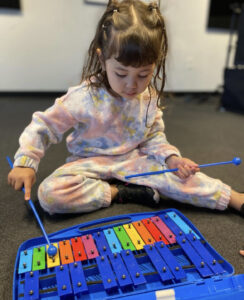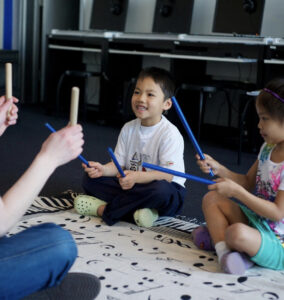What is the Best Age for your Child to Start Music Lessons?
 Experts agree that there is no right or wrong age for you to introduce your child to music. There are many benefits of giving children early exposure to music – even from birth!
Experts agree that there is no right or wrong age for you to introduce your child to music. There are many benefits of giving children early exposure to music – even from birth!
Think of all the wonderful toys babies respond to – all with happy and repetitive notes – like mobiles, and toys with colorful buttons that make joyous sounds when your child reaches out. And of course, even the most tone-deaf among us sing lullabies to our children. Most people don’t think of these early moments in a child’s life as “music lessons,” but your child’s brain is quickly developing, learning tones, rhythms, and language, and your child senses the joy and musicality of it all.
So, what is the best age to start music lessons? If you consider these early experiences as lessons, it’s never too soon to start! However, as children get older, parents may want to pursue more structured ways for their kids to begin learning music. Below are some guidelines and tips as you consider the ideal age for your child to start his or her musical journey.
Early Childhood Music Experience
For younger children, breaking down music concepts into fun, bite-sized activities that are engaging help children progress toward the goal of learning an instrument. The key to these types of early encounters is that it’s fun for the parent and child.
Music programs for children as young as one year old help students get an early introduction to instruments and build confidence for when they’re older. Often times, weekly parent-and-child group classes include playful activities like sing-alongs, story time, and instrument exploration. The most important aspect of this type of early learning is that the parent and child connect through the music and enjoy themselves.
Benefits of Music Classes for Children aged 1 – 3:
- Fosters creativity and self-expression.
- Builds locomotor skills and coordination through activities like dancing and playing instruments.
- Introduces babies and toddlers to basic math concepts, like number patterns, sequences, and fractions.
- Builds auditory skills used for language and reading.
- Studies have found that children with strong early music skills have stronger reading development.
Growing Up to More Structured Music Lessons
 Some experts say that more formal types of music lessons are possible at around age 3 or when a child is entering preschool. However, in all cases, it depends on your child’s attention span, and his or her dexterity and interest level. Introducing instruments along with storytelling and play really helps to engage preschoolers.
Some experts say that more formal types of music lessons are possible at around age 3 or when a child is entering preschool. However, in all cases, it depends on your child’s attention span, and his or her dexterity and interest level. Introducing instruments along with storytelling and play really helps to engage preschoolers.
For students aged 3-5, an ideal class at Bach to Rock is Rock City, in which children are introduced to a musical concept, a musical instrument, and a story time component. Musical concepts are taught through the story and its themes, and the concept is demonstrated on the musical instrument. For example, Bach to Rock teaches the pentatonic scale, but using colors and symbols.
According to Aaron Schmidt, Director of Curriculum at Bach to Rock, “It’s amazing to see how kids can learn complex musical concepts when we don’t give them names. They start improvising in just a few minutes.”
Kindergarten and First Grade (ages 5-7)
At this age range, it’s important that your child is interested and excited about the opportunity, considers it something fun, and isn’t pressured into starting lessons. The memories will last a lifetime, and it is key that they have a positive experience.
By now, students are ready to start playing some real songs on the piano. “We’re talking famous songs by Mozart, Beethoven, and American classics like When The Saints Go Marching In. It’s really impressive to see how far some of these students are able to go in such a short period of time,” says Schmidt.
Additionally, kids may not be leaning towards a particular instrument at this age level, and that’s okay! They may choose to experiment with a few different ones until they are able to home in on what they enjoy and the genre of music they like. Many programs like Fun with Music from Bach to Rock gives kids the chance to learn different parts of each instrument and beginner playing techniques.
Benefits of Lessons for Kids Aged 5-7
- Helps develop fine motor skills and hand-eye coordination.
- Builds time management and goal-setting skills.
- Assists with confidence-building and provides early performance experience and the chance to foster teamwork skills with other students.
- Teaches early math skills while learning about whole, half, and quarter notes, basic time signatures, and musical tempo.
- Engages auditory skills, which are tied to strong language and reading abilities.
Children Aged 7 and Up
Most children are ready for private lessons at around 7 years old, which is when they can learn to read sheet music, according to Schmidt. Focus and manual dexterity make that about the right time, too. It’s important that your child has the opportunity to learn via private or semi-private sessions, group lessons and beginner classes, as well as ensemble programs.
For older kids taking private lessons, repertoire is extremely important in their musical journey. Children receive custom private lesson books, which include arrangements of popular songs for every musical concept imaginable. “We have seen that students are much more likely to practice and make progress when they are taught with examples by AC/DC, Taylor Swift, and Dolly Parton among others, instead of forgotten public domain melodies,” adds Schmidt.
Window of Opportunity?
The “window” age varies from child to child, but encouraging your child to express themselves through music and follow their interests is essential at any age. It is important to get children enthusiastic about music before they start private lessons. That’s why early childhood classes are the perfect foundation.
As your child gets older, he or she will have developed their skills, have experience and love music enough that they want to take lessons and can practice on their own. “On the flip side, it’s never too late to start taking lessons. We have students who have started learning an instrument as old as 80! It’s all about finding music that you love and practicing the right way, no matter the age,” says Schmidt.
If your child has expressed an interest in music and you’re interested in helping them explore their musical inclinations, Bach to Rock music school offers many paths based on your child’s age and interests with locations all across the United States. Programs are available for children as young as toddlers, to kids who are ready to learn reading music and playing in a band, or even teens who already have their own band and are looking to further develop their skills!
